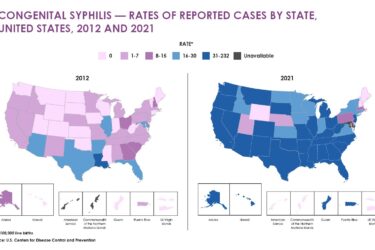
The Centers for Disease Control and Prevention on July 16 published data showing drug overdose deaths soared 30 percent in 2020. Public health experts say infectious diseases connected to illicit drug use, such as HIV, hepatitis, sexually transmitted diseases and endocarditis, likely rose as well.
The increase is considered linked to pandemic-related shutdowns of health care facilities that provide testing for infectious diseases and treatment for substance use disorder last year. Physicians also say they are observing a spike in substance misuse and an increase in new cases of HIV and other infections connected to drug use.
“I am a doctor in the jails, and so every time I go, I see a new patient with HIV,” said Alysse Wurcell, M.D., M.S., and assistant professor of medicine at Tufts University School of Medicine. “It’s a major problem that is under the radar. We are seeing a lot more pregnant women with HIV. Hepatitis C is a major problem. Syphilis is going up across the country too.”
During the pandemic, 13 percent of Americans said they started or increased substance use as a way to cope with the stress and emotions of the pandemic, according to the CDC, which also estimates 93,331 people died from a drug overdose during 2020 — a record high.
Prior to the pandemic, viral hepatitis and sexually transmitted disease cases were rising in connection with the worsening opioid drug epidemic. There were more than 2.5 million cases of chlamydia, gonorrhea, syphilis and congenital syphilis diagnosed in 2019 — the sixth consecutive annual jump in cases, according to the CDC. In addition, cases of hepatitis A and C almost tripled between 2015 and 2019. (CDC data lags by about a year and 2019 is the most up to date information available.)
Bucking the trend was HIV. In 2019, the CDC said the number of new cases fell about 8 percent to 34,800 from 37,800 in 2015, according to HIV.gov, the U.S. Health and Human Service department’s official website on HIV information. Researchers say a Trump administration initiative launched in 2019 to increase HIV testing and to subsidize drugs that prevent HIV from becoming AIDS may have had a positive impact on the 2019 decline.
HIV advocates, however, are worried that the fight against HIV was derailed during the pandemic because hundreds of syringe services clinics, where people can access HIV testing, clean needles and receive referral to substance use disorder treatment, were closed.
“COVID was a huge setback,” Jeffrey Crowley, a former director of the White House Office of National AIDS Policy who is now at Georgetown University, told Fortune magazine.
In response to the rising number of overdose deaths, the Biden administration’s Office of National Drug Control Policy has made a priority funding for substance abuse disorder treatment and syringe service clinics — the first time for a presidential administration. Whether these efforts will help stop overdose deaths and infections will bear watching and covering.
Here are some infectious disease experts to help your reporting about HIV, hepatitis and sexually transmitted diseases:
- Alysse Wurcell, M.D., M.S., assistant professor of medicine at Tufts University School of Medicine, AWurcel@tuftsmedicalcenter.org; an expert on health in prison populations, infectious diseases and HIV.
- Rachel Bender Ignacio, M.D., M.P.H., assistant professor, University of Washington School of Medicine, rbi13@uw.edu; expert in HIV, hepatitis and COVID-19.
- Judith Feinberg, M.D., F.I.D.S.A, E.B. Flink Vice Chair of Medicine for Research, West Virginia University, judith.feinberg@hsc.wvu.edu; an expert in harm reduction, HIV, syringe service clinics and infectious diseases.
- Susana Lazarte, M.D., assistant professor, University of Texas Southwestern Medical Center; an expert on global HIV, HIV in the U.S. South and within Latinx communities. Reachable via media services: news@utsouthwestern.edu.
- Peter Leone, M.D., professor of medicine, division of infectious diseases, University of North Carolina Gillings School of Public Health, peter_leone@med.unc.edu; an expert in sexually transmitted diseases and infectious diseases.






